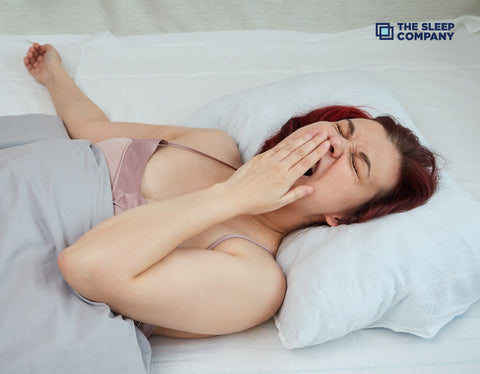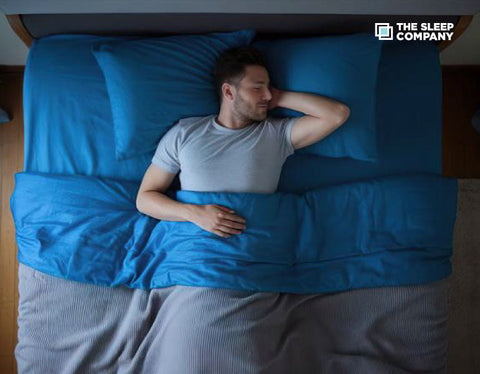My Cart

Let’s Exercise for Better Sleep!

Sleep is an important factor in ensuring that you lead a healthy life. There are various ways in which you can improve the quality of your sleep – exercise being one of the primary ones. There has been a considerable amount of research done on the connection between exercise and sleep. It indicates that regular exercise helps improve sleep-related issues.
Modern scientists concur that there is a reciprocal relationship between sleep and exercise. Thus, improving your exercise regimen may help you sleep better, while obtaining enough sleep may encourage healthier levels of physical activity throughout the day. Creating a successful fitness plan requires an understanding of this intricate interplay.
How Does Exercise Improve Sleep?

A consistent exercise routine improves your fitness level and ensures that you sleepwell. A work-out enhances your sleep quality in the following ways:
Reduce the time required to fall asleep:
Exercise can improve your sleep quality by reducing the amount of time spent awake in bed at night. Exercise can also help you feel less sleepy during the day and, for some people, reduce your need for sleeping pills.
Weight control:
A person who engages in moderate to vigorous physical activity is less likely to gain too much weight, which reduces their likelihood of developing obstructive sleep apnea symptoms. Obesity has been implicated in over 60% of instances of moderate to severe obstructive sleep apnea.
Exercise wears the body out:
Physically demanding activities like exercise heighten the pressure to sleep that develops naturally during the day. While you are awake, this pressure, often referred to as the homeostatic sleep drive rises. Your sleep drive is reset when you sleep, and it starts over the next morning.
Strengthening of circadian rhythms:Bright light exposure, particularly in the morning, can assist in regulating the body’s internal body clock and encourage sleep at night. According to a study, morning exercise outdoors may support the maintenance of circadian rhythms. Exercise outdoors during the day can promote sleep in two distinct yet equally effective ways, which is why people who have trouble falling asleep frequently benefit from exposure to natural light when they are awake.
Reduces anxiety and insomnia:
Exercise that ranges from moderate to high intensity has been proven to relieve stress for several hours. One study found that persons with insomnia who engaged in a single session of moderate-intensity aerobic exercise saw a significant decrease in anxiety. They fell asleep faster and stayed asleep longer thanks to this kind of exercise, which also decreased the time it took them to fall asleep in half.
What Type of Exercise is Best for Sleep?
To ensure a restful night’s sleep, the below-mentioned exercises are recommended.
Cardiovascular activity and aerobic exercise:
Cardiovascular activity speeds up your heart rate and blood flow. It can lower blood pressure and lower your chance of developing heart disease. People with insomnia and other sleep disorders have proved to benefit most from aerobic exercise. This kind of activity can increase overall sleep quality, total sleep time, and ability to sleep through the night.
Resistance exercise:
Exercise that requires your muscles to operate against a weight or force is known as resistance training. Your sleep can be improved by doing resistance exercises and lifting weights. Any muscle-strengthening exercise has been linked to better sleep quality.
Yoga:
Yoga is an excellent approach to enhancing both physical and mental health. It emphasizes breathing, meditation, and adopting various positions. According to research, yoga helps ease stress, lessen anxiety and despair, and enhance mental health. Additionally, it has been demonstrated to help sleep in a variety of demographics.
Running:
Research has shown that regular running promotes restful sleep. Regardless of age, those who regularly exercise are less likely to suffer from insomnia and other sleep-related issues. Running for 20 to 30 minutes every other day is the best starting point for newcomers. If you’re an expert runner, it’s critical to plan your weekly training so there is a wide diversity of activities.
When Should You Exercise for Better Sleep?
There is not a fixed fitness routine that will help your sleep because everyone responds to exercise differently. However, several studies have shown the following observations:
Morning exercise is good to go:
According to research, exercising earlier in the day offers the body enough time to relax and allows the parasympathetic nervous system to take over, enabling one to unwind before going to bed. Therefore, compared to night-time activity, morning exercise is thought to result in more restful sleep.
Avoid night-time exercise:
Studies have indicated that evening exercise can increase heart rate and that persons who exercise at night may have less rapid eye movement sleep. Light exercise before bed may be beneficial for some people, but most experts concur that intense exercise might interfere with falling a sleep.
Scheduling high-intensity workouts:
The majority of workouts are rated as moderate- or high-intensity. Running or jogging, lap swimming, and uphill trekking are all examples of high-intensity exercise. The best time to engage in high-intensity exercise is morning or evening rather than a late workout.
Exercise Tips for Getting Better Sleep

A vital part of good sleep hygiene is regular exercise. Along with a disciplined exercise routine, the following factors should be taken into consideration:
Exercise for thirty minutes:
Set your health and sleep as a top priority by making a daily commitment to 30 minutes of moderate exercise. You don’t need to overdo it because, after just 30 minutes of exercise, you will start to feel the benefits in your ability to sleep, even though longer and more strenuous workouts will improve your physical health.
Explore your preferred exercise schedule:
Not everyone finds success working out in the morning. Find a schedule that works for you by experimenting with different things. Find a routine and schedule that work for you. Consistency is crucial.
Get consistent sleep for challenging workouts: It is crucial to have a good night’s sleep before your high-intensity training. After a sound sleep, you’ll be more motivated to get up and hit the gym.
Sleep on a comfortable mattress:
A good mattress will compliment your exercise routine and improve your sleep quality.You can buy mattress online or go for offline purchasing. Next-gen mattresses such as The Sleeping Company’s SmartGRID mattress perfectly adjust to your body shape for excellent comfort.
Wear a fitness tracker:
Fitness trackers are excellent for keeping track of workouts and maintaining motivation. A majority of them also include detailed sleep information. Your ability to choose the routine that best suits your life will be aided by having this information at your disposal. Additionally, it may provide you with insightful information about your sleep pattern that you may utilize to improve your health and exercise regimen.
Additional Tips for Better Sleep
- Selecting an adjustable bed might improve your sleep quality. An adjustable bed lets you alter the alignment of your mattress to ensure that you get the finest possible night’s sleep. You can buy adjustable bed online from various top brands.
- Sleeping solutions such as pillows, and bed sheets, can enhance your sleep quality. High-quality head and neck comfort is provided by hybrid pillows, such as The Sleeping Company’s SmartGRID Hybrid Pillow.
- Listening to music can help you fall asleep. The use of music to promote better sleep quality and assist in falling asleep may be advantageous for many people.
Conclusion:
Exercising will not only help you fall asleep more soundly at night, but it will also likely prolong your life. The above-mentioned guidelines will help you in planning your exercise regime. So keep working out and live a healthy life!





























































